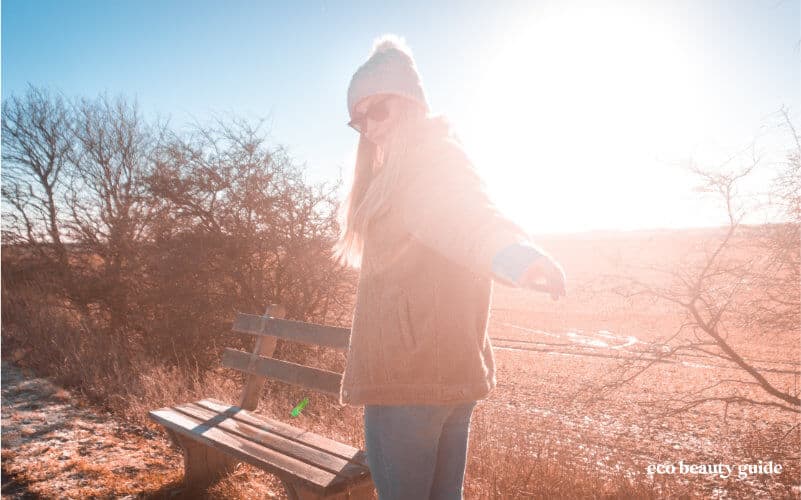Why You Should Use Sunscreen in Winter
As the temperatures plummet and winter coats come out, there’s one summer essential that often gets forgotten – your trusty bottle of sunscreen. Surprised? It’s a common misconception that sunscreen is only a summer necessity, a must-have for beach days and picnics.
However, those harmful UV rays don’t hibernate in the winter! They persist, regardless of the chill in the air or the snow on the ground. This article is set to debunk the myth that sunscreen in winter is unnecessary and to shed light on the importance of year-round skin protection. So, grab your hot cocoa, get cozy, and let’s delve into the often-overlooked winter necessity – sunscreen.
Why Sunscreen is Essential in Winter
As the winter season sets in, the sun may seem less intense, leading many to believe that sunscreen is not as crucial. However, this is far from the truth. Even in the colder months, UV rays are ever-present and relentless in their exposure. While UVB rays, the primary cause of sunburn and direct DNA damage, decrease in strength during winter. However, UVA rays remain consistent throughout the year. These rays penetrate deeper into the skin, leading to premature aging and long-term skin damage.
Furthermore, snow and ice can reflect up to 80% of UV rays, increasing your exposure and intensifying their effects. Using sunscreen in winter is just as important as in summer to protect your skin from the harmful winter sun.
Most Radiation Can Pass Through Clouds
Extensive research indicates that over 75% of radiation, such as UV rays, can effortlessly penetrate through clouds. This poses a significant concern as moisture in the air can refract light, intensifying its impact on the skin and causing discreet burns. To safeguard vulnerable areas like the top of your nose, it is crucial to adequately cover yourself and consider wearing a hat. Prioritize protection against these harmful effects.
The Higher You Are, the More Radiation You Get
When embarking on a mountain trip, it’s crucial to be mindful of the fact that UV light exposure increases by 5-6% for every 900-1000 feet above sea level. This is due to the reduced amount of matter through which the UV radiation passes, thus intensifying its impact. Consequently, it becomes even more imperative to don protective gear while outdoors at high altitudes.
Skin Cancer Risks
Unfortunately, if you’re exposed to UV rays without protection, it can lead to more than just aging and sunburn. One such risk is skin cancer, a potentially life-threatening condition. Both UVA and UVB rays contribute to the development of skin cancers by causing mutations in the DNA of skin cells. UVB rays cause more mutations, but UVA rays also contribute because they penetrate deeper and are present all year. In fact, studies have shown that repeated, unprotected exposure to UVA rays can increase the risk of melanoma, the deadliest form of skin cancer. Therefore, even in the heart of winter, skipping on your sunscreen can lead to significant health risks. It’s not just about maintaining youthful skin, it’s about protecting it from potentially life-threatening diseases.
Cancer Found on The Neck and Scalp
It is crucial to recognize that 9-11% of the most fatal cancers occur in the regions of the head and neck. These areas are frequently exposed to harmful rays throughout the day. By wearing sunscreen, you can not only shield yourself from burns but also potentially safeguard your life.
Benefits of Wearing Sunscreen in Winter
Beyond guarding against skin cancer, wearing sunscreen in winter offers a slew of additional benefits. One often overlooked advantage is that it helps maintain an even skin tone. The sunscreen acts as a barrier to UV rays, preventing the development of skin discolorations and dark spots. In addition, lots of sunscreens now have moisturizing ingredients. These ingredients help keep your skin hydrated in winter. By using a moisturizing sunscreen, you can protect your skin from harmful radiation and fight winter dryness. And let’s not forget – sunburns can happen even in winter, particularly in snowy conditions where UV rays reflect off the snow. By using sunscreen, you’re preventing painful burns and potential skin damage. Therefore, sunscreen is a winter necessity, not just a summer accessory.
Less Exposure to Radiation Slows Some Aging
Excessive exposure to UV light can lead to biological oxidation, resulting in premature aging of the skin. To minimize this, it is important to limit your exposure to radiation. If complete coverage is not possible, consider using a high-quality sunscreen that provides physical protection against UV rays. These sunscreens are often thick and white and contain ingredients like Zinc oxide that create a protective barrier. They are readily available in most stores.
Why You Should Wear Sunscreen in the Winter
So, let’s set the record straight — sunscreen is not just a beach-day accessory, but an absolute must-have for every day of the year, winter included. Despite the chilly temperatures and shorter daylight hours, harmful UV rays persist, posing a risk of skin cancer, premature aging, and skin discoloration. Look for a moisturizing sunscreen, perfect for combating winter dryness while providing essential UV protection. And remember, snowy landscapes can intensify sunburn risk due to reflected radiation. So, whether you’re hitting the ski slopes or just running errands on a sunny winter day, don’t forget to slather on some SPF. After all, it’s better to be safe than sorry when it comes to your skin health.
Now I’d like to hear from you. Do you wear sunscreen during the winter? Leave your comment below.






